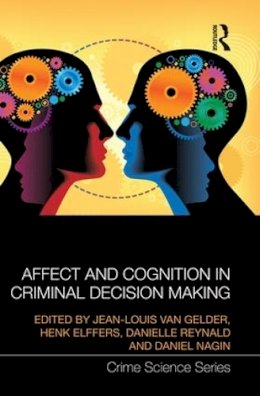
Stock image for illustration purposes only - book cover, edition or condition may vary.
Affect and Cognition in Criminal Decision Making
. Ed(S): Van Gelder, Jean-Louis; Elffers, Henk; Reynald, Danielle M.; Nagin, Daniel S.
FREE Delivery in Ireland
Description for Affect and Cognition in Criminal Decision Making
Paperback. Editor(s): Van Gelder, Jean-Louis; Elffers, Henk; Reynald, Danielle M.; Nagin, Daniel S. Num Pages: 269 pages, 23 black & white illustrations, 31 black & white tables, 23 black & white line drawings. BIC Classification: JKV; JMH; JMK. Category: (UP) Postgraduate, Research & Scholarly; (UU) Undergraduate. Dimension: 236 x 158 x 26. Weight in Grams: 416.
Research and theorizing on criminal decision making has not kept pace with recent developments in other fields of human decision making. Whereas criminal decision making theory is still largely dominated by cognitive approaches such as rational choice-based models, psychologists, behavioral economists and neuroscientists have found affect (i.e., emotions, moods) and visceral factors such as sexual arousal and drug craving, to play a fundamental role in human decision processes.
This book examines alternative approaches to incorporating affect into criminal decision making and testing its influence on such decisions. In so doing it generalizes extant cognitive theories of criminal decision making by incorporating ... Read moreaffect into the decision process. In two conceptual and ten empirical chapters it is carefully argued how affect influences criminal decisions alongside rational and cognitive considerations. The empirical studies use a wide variety of methods ranging from interviews and observations to experimental approaches and questionnaires, and treat crimes as diverse as street robbery, pilfering, and sex offences. It will be of interest to criminologists, social psychologists, judgment and decision making researchers, behavioral economists and sociologists alike.
Show Less
Product Details
Publisher
Taylor & Francis Ltd United Kingdom
Place of Publication
London, United Kingdom
Shipping Time
Usually ships in 4 to 8 working days
About . Ed(S): Van Gelder, Jean-Louis; Elffers, Henk; Reynald, Danielle M.; Nagin, Daniel S.
Jean-Louis van Gelder currently works as a researcher at the Netherlands Institute for the Study of Crime and Law Enforcement (NSCR). His research interests focus on criminal decision making where he applies insights from social psychology and social cognition to study the interplay of affect and cognition on criminal decisions. Recently, he started researching multiple self models and future self ... Read morecontinuity, to apply them to criminal behavior. Other research interests include personality and crime and informality in developing countries. Henk Elffers is a senior-researcher at NSCR and professor of empirical research into criminal law enforcement at VU University Amsterdam. He has worked in the field of rule compliance, spataila criminology, rational choice, guardianship, punishment. Daniel Nagin holds a PhD in Urban and Public Affairs from Carnegie Mellon University, where he is now the Teresa and H. John Heinz III University Professor of Public Policy and Statistics, and a specialist on deterrence theory. He has amply published on various aspects of the rational choice paradigm in criminology. Danielle Reynald trained as a social-psychologist (London) and did a Ph.D in criminology (Amsterdam). She is a lecturer in Criminology at Griffith University, where she teaches spatial and environmental criminology. Her specialism is guardianship research. Show Less
Reviews for Affect and Cognition in Criminal Decision Making
"Personally, the editors (and contributors) convinced me of the critical importance of this field in criminology." Benoit Leclerc, PhD, Senior Lecturer, School of Criminology and Criminal Justice, Griffith University This collection of papers is a timely and important contribution to our understanding of criminal decision making. It extends the utility of rational choice theory, and enhances its ... Read morepotential for further practical application. Professor Max Taylor, University of St Andrews Some while ago I called for researchers in situational crime prevention to ‘make offenders richer’, in the sense of adding emotional and motivational depth to the two-dimensional Rational Choice model, valuable though that has been and will continue to be. Understanding the whole person of the offender – by incorporating affect – can both sharpen and widen our options in designing situational interventions, and suggest new interventions that we have not yet envisaged. The authors of this book have enriched the offender indeed, and in so doing have enriched crime science and criminology in a seminal collection of papers that will stimulate research, theory and practice for years to come. Paul Ekblom, Professor of Design Against Crime, University of the Arts London This book makes a unique contribution to the offender decision making literature. Examined in the chapters are the implications of recent developments in emotion research for our understanding of how offenders make decisions. These insights will enhance our knowledge of offending and crime prevention. Professor Anna Stewart, Griffith University, Australia Show Less

